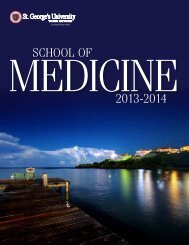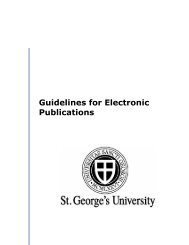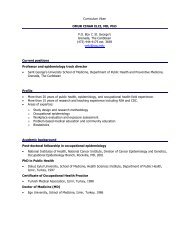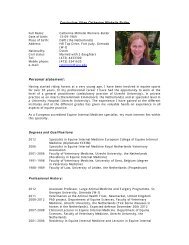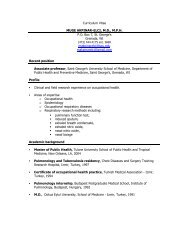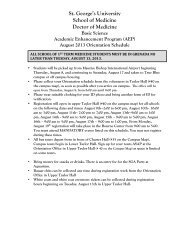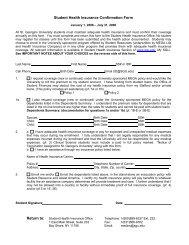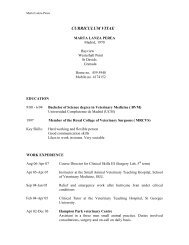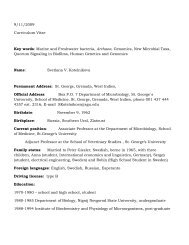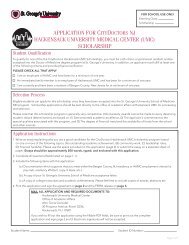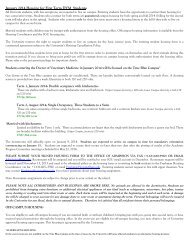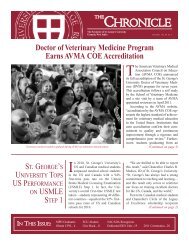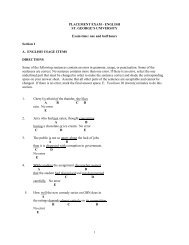SVM Catalogue 2012-2013 - St. George's University
SVM Catalogue 2012-2013 - St. George's University
SVM Catalogue 2012-2013 - St. George's University
You also want an ePaper? Increase the reach of your titles
YUMPU automatically turns print PDFs into web optimized ePapers that Google loves.
greater depth in the veterinary medical program; others,<br />
such as biochemistry, are completed in the preveterinary<br />
medical program. Mastery of English and study skills are also<br />
emphasized. <strong>St</strong>udents will have some exposure to clinical<br />
veterinary medical practice both in clinics and in the field.<br />
Depending on the country of origin and academic<br />
background, students enter the preveterinary medical<br />
program for a period of one to three years with the<br />
expectation of eventually being promoted into veterinary<br />
medicine when the preveterinary medical studies are<br />
completed. When students apply for entry into preveterinary<br />
medicine, a decision will be made as to whether or not they<br />
have the academic background to enter directly into the<br />
third year. <strong>St</strong>udents who lack an appropriate foundation in<br />
biology, chemistry, physics, social sciences, mathematics,<br />
written and spoken English, and/or mature study skills will be<br />
asked to complete a preparatory program that is between<br />
one and four terms in length.<br />
The veterinary medical program curriculum is extremely<br />
demanding and students are required to demonstrate their<br />
ability to succeed both in terms of knowledge base and<br />
interpersonal skills. Promotion into the veterinary medical<br />
program is dependent upon successfully completing<br />
the third year of the preveterinary medical program with<br />
a minimum grade point average of 3.0, and successful<br />
completion of a comprehensive examination at the end of<br />
the year. <strong>St</strong>udents who do not hold a first degree and wish<br />
to obtain a bachelor’s degree in the course of their studies<br />
may be eligible to do so. Evaluation of prior educational<br />
background will determine eligibility and placement within<br />
the BS/DVM program. Applicants presenting secondary<br />
school, Advanced Level of the General Certificate of<br />
Education, the International Baccalaureate, or university/<br />
college undergraduate credentials will be assessed<br />
individually, and will be considered for appropriate entry<br />
into the preveterinary medical program.<br />
Entry Requirements: All Applicants<br />
1. <strong>St</strong>atement of Financial Support. The applicant must<br />
provide a financial plan indicating adequate funding for<br />
the duration of the complete veterinary medical program.<br />
the Test of English as a Foreign Language (TOEFL), or a<br />
7.0 overall score on the International English Language<br />
Testing System (IELTS). (The <strong>University</strong>’s TOEFL code is<br />
2864.)<br />
Preveterinary Medicine: Year 1<br />
a. Passes in GCSE Ordinary Levels (or the equivalent) are<br />
required in mathematics, science, biology, chemistry,<br />
English, and at least one other subject.<br />
Or<br />
b. High school diploma (or the equivalent) with a strong<br />
GPA in science and SAT scores.<br />
Preveterinary Medicine: Year 2<br />
a. A Matriculation Examination, such as the South African<br />
or Australian Examination (or its equivalent), with strong<br />
science grades.<br />
Or<br />
b. Minimum of 30 university/college undergraduate level<br />
credits that include some science foundation courses.*<br />
Preveterinary Medicine: Year 3<br />
a. IB Diploma or a minimum of three GCE Advanced Level<br />
Examinations (or the equivalent) with strong science<br />
grades.<br />
Or<br />
b. Minimum of 60 university/college undergraduate level<br />
credits that include all science foundation courses,* with<br />
the exception of biochemistry and genetics.<br />
*The science foundation courses are the following requisite undergraduate<br />
level courses for promotion into the veterinary medical program: Biology I and<br />
II with laboratory, Organic Chemistry I with laboratory, Inorganic Chemistry<br />
I and II with laboratory, at least one semester physics with laboratory, one<br />
semester of genetics, one semester of biochemistry, either one semester of<br />
calculus, computer science or statistics, one semester of English, and Organic<br />
Chemistry II with a laboratory, or appropriate science elective.<br />
School of Medicine<br />
Admission<br />
2. If English is not the principal language, the applicant<br />
must have achieved a minimum score of 600 (paperbased),<br />
250 (computer-based), or 100 (Internet-based) on<br />
School of Veterinary Medicine Catalog <strong>2013</strong>–2014 | 75



